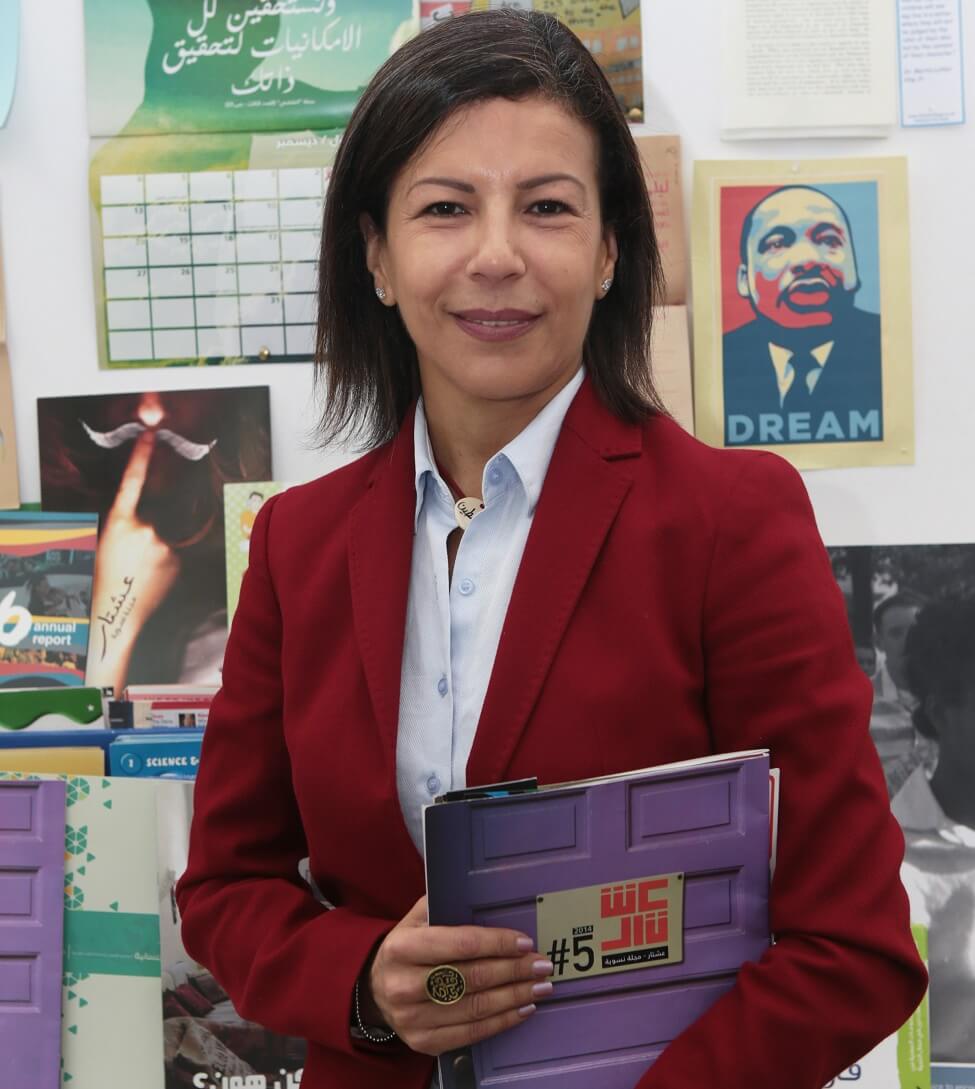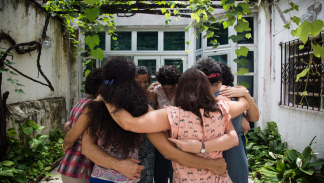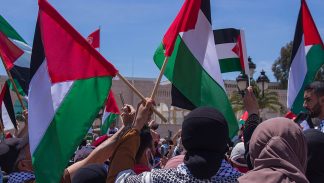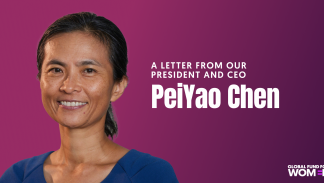Reclaiming Rights for LBTQI People in Palestine
No matter where you are in the world, teaching young people about sex and sexuality and advocating for the rights of LGBTQI people requires boldness and bravery. But Global Fund for Women grantee partner Aswat Palestinian Gay Women faces an especially complex, and uniquely challenging, set of circumstances, as they do this work within Palestinian communities in Israel and the Occupied Palestinian Territories. Not only do they face universal challenges like other LBTQI groups, including opposition from patriarchal societies and traditions that want to limit women’s freedoms around sexuality or sexual health, but they do so in the midst of a volatile political situation where they are constantly asked if their mission should be a priority.
“The entire issue of women’s sexuality, sexual rights, and freedoms is problematic to talk about [in Palestine]. One of the main challenges is that the conflict affects each and every aspect of our lives. The political tensions and turmoil constantly hinders our work and activism, so anything can happen. The government can decide they want to transfer a Bedouin village for example, and then the entire population is concerned with this issue and mobilizes their efforts toward resisting these policies, and yet we still have to bring this agenda [of LBTQI rights] to the table,” says Ghadir Shafie, co-director of Aswat. “People often ask, ‘Is [supporting LBTQI rights] the most important thing? We have so many issues in our society, is this what we should prioritize? We need to be free of occupation first and we need women to be equal to men before we focus on that.’ From the very beginning, Aswat has worked to connect our struggles as women, as queer people, and as Palestinians. We believe that the struggles cannot be prioritized; rather, one is dependent on another.”
Aswat, which means “voices” in Arabic, was established in 2003 with the aim of providing safe, supportive, and empowering spaces for Palestinian LBTQI—lesbian, bisexual, transgender, queer, and intersex—women who live in historical Palestine. They conduct trainings on sexual health, sexual orientation, and gender identity for groups including young people, activists, professional service providers, and women’s groups, creating a space for people to talk about sex and sexuality and learn more about LBTQI rights. They also run a knowledge production program where they create pamphlets, books, newsletters, and magazines—available for download on their website and disseminated to schools, libraries, and elsewhere—about sexual health and sexual identity issues. Their pamphlets are downloaded by more than 5,400 people annually and shared not just in Israel and Palestine but in countries throughout the Middle East and North Africa region. Through their training courses, they reach around 400 people a year.
Since their founding, Aswat has become an integral part of Palestinian women’s human rights movements working alongside women’s organizations that are not necessarily LBTQI allies by taking an intersectional approach. “We united the discourse on feminism, queerism, and resistance to all forms of oppression into one monumental struggle. We are in solidarity with all Palestinians, not just a segment of Palestinian society,” says Ghadir. “Allowing space to talk about the multiple forms of oppression brings more people into your cause. The intersectionality of struggles has always been a tool to bring more people together.”

This multi-dimensional approach is also part of Aswat’s overall philosophy. While they focus on reaching out to and advocating for LBTQI women, the scope of their work is not only about sexual health and sexuality, but also about women’s rights and human rights. “You can’t just talk about sexuality without relating to other things, because we are not just sexual creatures. It’s an entire package of making people more aware of themselves, their environment, of their rights as women, of the challenges that women face from a religious or social perspective, of the chains people put on women and their freedom,” says Ghadir. “Women’s sexuality—and sexuality in general—is taboo in these communities. It’s not something that is discussed. Women are not supposed to have ownership over their bodies. So it’s very important to bring the whole package—what it means to be a woman, what it means to be a feminist, to be sometimes a mother, a wife, a sister. There are so many layers in talking about Palestinian women’s sexuality, but we are trying to break the wall brick by brick.”
Aswat also is actively resisting political oppression in their work, by resisting “pinkwashing”—the promotion by the Israeli state of their gay rights advances as evidence of Israel’s tolerance and modernity, as a way to distract from its violation of Palestinian human rights. In fact, Palestinian organizations like Aswat aren’t able to access funds and support that are available to comparable Israeli organizations due to restrictions by the Israeli government. As a result, young LGBTQI Palestinians have incredibly limited access to resources about their sexuality and rights. “Pinkwashing is not just an international strategy in order to deflect attention from the gross violation of human rights against Palestinians, it is also an internal agenda to keep us at a constant disadvantage,” explains Ghadir. “They don’t want us to talk about sexuality. They portray Palestinians as backwards and primitive and homophobic,” when in fact the Israeli government is actively restricting Palestinians’ access to information about their sexual health and rights.
Despite challenges and intense opposition, Ghadir feels optimistic about the future of LBTQI rights in Palestine, because she sees an increasing number of people across all areas of Palestinian society—not just LBTQI activists—reaching out to Aswat about their work. “What really pleases me today is that, even though there is a powerful religious movement and a lot of patriarchy, I see that on the individual basis, people are more open-minded. They want to learn, they feel it as a personal responsibility, as women, as parents, to have this knowledge. This is what gives me hope,” says Ghadir. “And the more I see women and young girls aware of what’s going on, they become more independent, they become more capable, self-sufficient, and articulate. [Having this knowledge] liberates you, and frees you, and allows you to achieve your goals.”
Photography by Maya Levin for Global Fund for Women.
The more I see women and young girls aware of what’s going on, they become more independent, they become more capable, self-sufficient, and articulate. [Having this knowledge] liberates you, and frees you, and allows you to achieve your goals.Ghadir Shafie, Aswat


